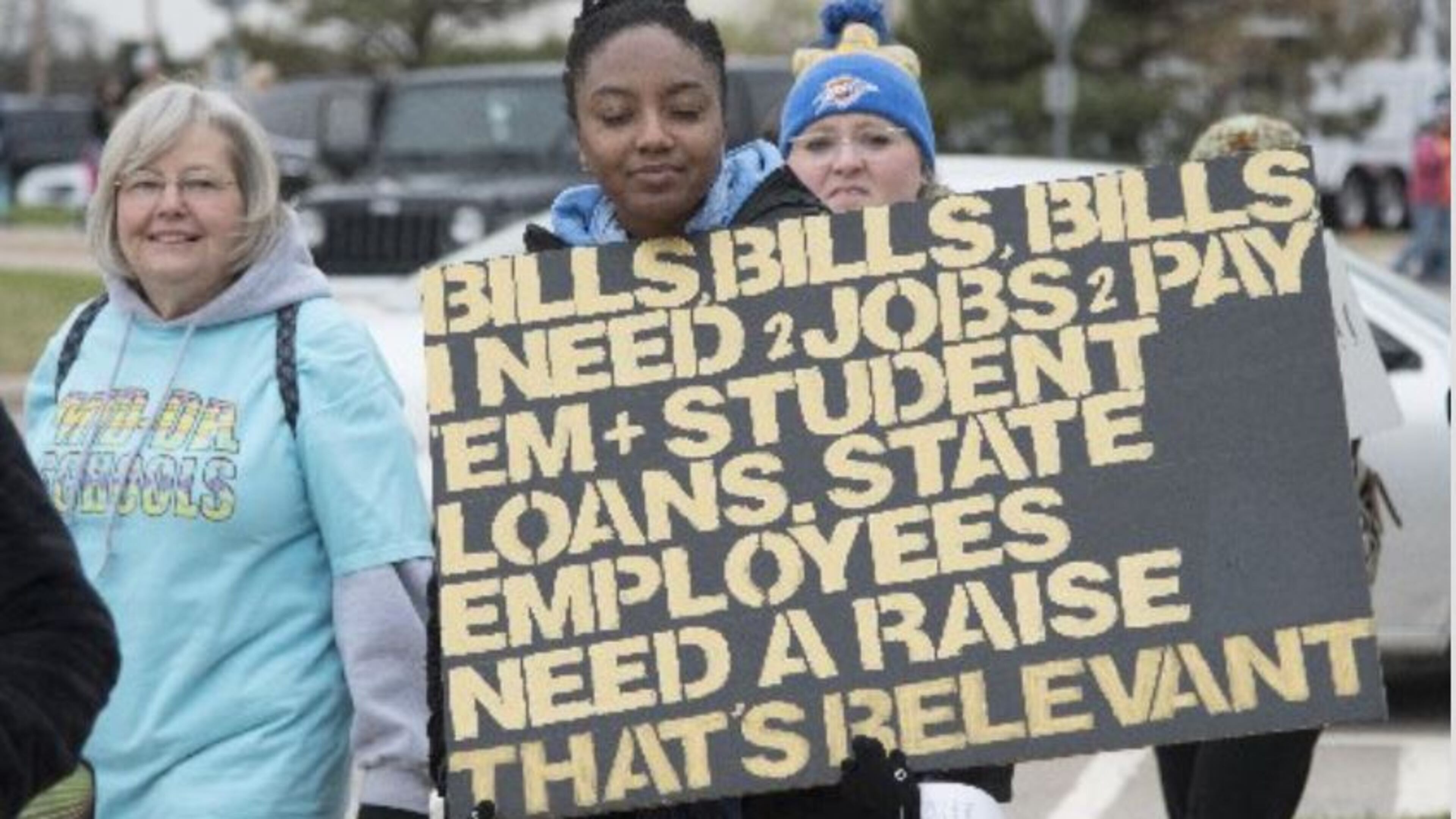New report: Record wage gap between teachers and other college grads

The Economic Policy Institute issued an analysis Wednesday that found teachers were paid 21.4% less in 2018 in weekly wages than similar college graduates after accounting for education, experience, and other factors.
A nonpartisan think tank, EPI describes the percent by which public school teachers are paid less than other college-educated workers as the “teacher wage and compensation penalty.”
The report said the penalty reached a record high in 2018. The analysis finds the Georgia gap is even larger than the national average; in Georgia, the pay gap between teachers and similar college graduates last year was 25.4% -- which gave us the 9th largest gap in the country.
Several of the states with higher gaps have seen teacher protests, including Arizona, Virginia, Oklahoma, Colorado and North Carolina. (Teacher groups in North Carolina and South Carolina are planning protests next week on May 1 to demand higher pay.)

According to the analysis: The average weekly wages of public school teachers (adjusted for inflation) decreased $21 from 1996 to 2018, from $1,216 to $1,195.
In comparison, weekly wages of all other college graduates rose by $323, from $1,454 to $1,777 over this period.
The analysis concludes the teacher weekly wage penalty has grown from 5.3% in 1993 to 12.0% in 2004, before reaching a record 21.4% last year.
While diminished teacher pay has been blamed on the recession, the report says state priorities and policies played a major role, citing research that most of the 25 states that were still spending less for K–12 education in 2016 than before the recession also chose to enact tax cuts.
Among those states with the greatest reductions to their education budgets that still opted to cut taxes between 2008 and 2016 was Georgia.
The benefits teachers earn are often presented as a counterweight to the low pay, but EPI Distinguished Fellow Lawrence Mishel and EPI Research Associate and University of California economist Sylvia Allegretto said benefits, while reducing the penalty, did not negate it.
When you look at wages plus benefits, teachers earned 13.1% less than similar college graduates in 2018. (To address the nine-month contracts that teachers have, researchers examined differences between teachers and other college graduates in weekly wages for weeks worked.)
In a statement, Mishel said, “It’s no surprise that the states that have seen teachers strike and walk out over the past year are the states that have some of the highest teacher wage penalties. While teacher pay is only part of the story, it is an important element. If we are going to have excellent schools, we must make sure that teachers are paid for their work.”
Here is an excerpt of the analysis. Read the full report here:
The mid-1990s marks the start of a period of sharply eroding teacher weekly wages and an escalating teacher weekly wage penalty
Average weekly wages of public school teachers (adjusted for inflation) decreased $21 from 1996 to 2018, from $1,216 to $1,195 (in 2018 dollars). In contrast, weekly wages of other college graduates rose by $323, from $1,454 to $1,777, over this period.
For all public-sector teachers, the relative wage penalty (controlling for education, experience, and other factors known to affect earnings) has grown substantially since the mid-1990s. The teacher weekly wage penalty was 5.3 percent in 1993, grew to 12.0 percent in 2004, and reached a record 21.4 percent in 2018.
Wage penalties have grown significantly for both men and women teachers
The wage premium that women teachers enjoyed in the 1960s and 1970s has long been erased, replaced by a growing wage penalty. Our previous research found that in 1960 women teachers earned 14.7 percent more in weekly wages than comparable women workers. This report finds that the teacher weekly wage premium for women teachers had fallen to 6.9 percent in 1979. And the wage premium for women teachers gradually faded over the 1980s and 1990s, until it was eventually replaced by a large and growing wage penalty in the 2000s and 2010s. In 2018, women public school teachers were making 15.1 percent less in wages than comparable women workers.
The wage penalty for men teachers is much larger. The weekly wage penalty for men teachers was 17.8 percent in 1979; it improved to 14.2 percent in 1993 but worsened in the late 1990s and into the early 2000s. In 2018, men teaching public school were making 31.5 percent less in wages than comparable men in other professions.
Improvements in benefits relative to professionals have not been enough to offset the growing teacher wage penalty
While relative teacher wage penalties have worsened over time, some of the difference may be attributable to a trade-off between wages and benefits. In other words, school districts may not be giving teachers raises but are instead offering stable or slightly better benefits such that benefits make up a larger share of the overall compensation package for teachers than for other professionals. In 2018, nonwage benefits made up a greater share of total compensation for teachers (29.1 percent) than for professionals (21.5 percent).
As a result of their growing benefit share of compensation, teachers are enjoying a "benefits advantage" over other professionals that has grown from 1993 to 2018, rising from 2.4 percent to 8.4 percent. However, this benefits advantage has not been enough to offset the growing wage penalty. The total teacher compensation penalty was 13.1 percent in 2018 (composed of a 21.4 percent wage penalty offset by an 8.4 percent benefits advantage), just slightly less than the record high 13.3 percent compensation penalty in 2017. The bottom line is that the teacher compensation penalty grew by 10.2 percentage points from 1993 to 2018.
It used to be the good stuff about teaching outcame the lower pay. Not sure many teachers would agree with that anymore.
Your view?

